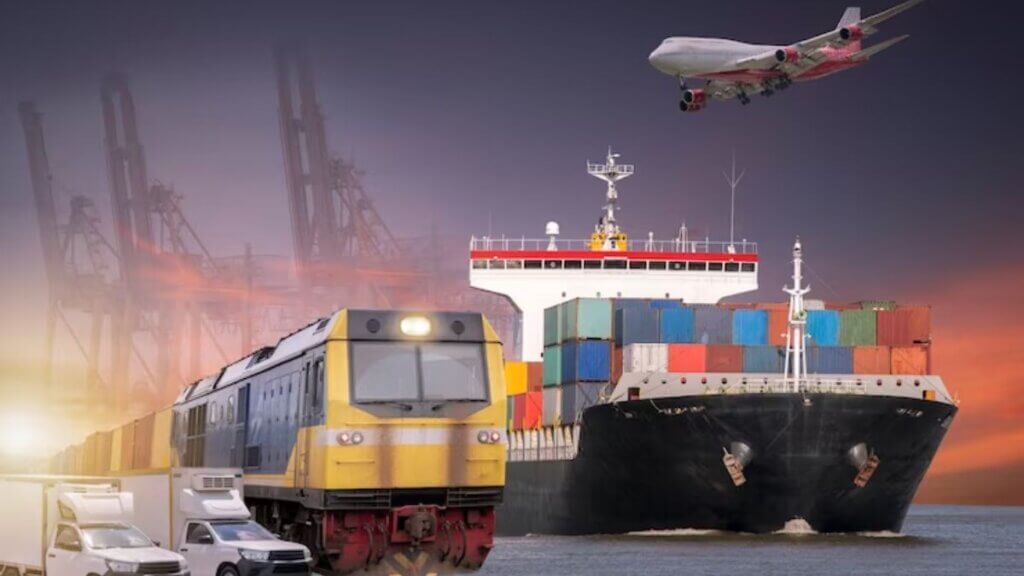
Meaning of Freight Forwarding
Freight forwarding means transporting goods across international borders by ship or air. They act as intermediaries between shipper and receiver.
They have the responsibility to provide warehouse, insurance, and customs brokerage.
Freight Forwarding Meaning In Tamil
சரக்கு அனுப்புதல் (freight forwarding) என்பது கப்பல் அல்லது விமானம் மூலம் சர்வதேச எல்லைகளுக்குள் பொருட்களை கொண்டு செல்வதாகும். அவர்கள் ஏற்றுமதி செய்பவருக்கும் பெறுநருக்கும் இடையில் இடைத்தரகர்களாக செயல்படுகிறார்கள். கிடங்கு, காப்பீடு மற்றும் சுங்கத் தரகு ஆகியவற்றை வழங்குவதற்கான பொறுப்பு அவர்களுக்கு உள்ளது.
Freight Forwarding Meaning In Hindi
माल अग्रेषण का अर्थ है जहाज या हवाई मार्ग से अंतर्राष्ट्रीय सीमाओं के पार माल पहुंचाना। वे प्रेषक और प्राप्तकर्ता के बीच मध्यस्थ के रूप में कार्य करते हैं। उनके पास गोदाम, बीमा और सीमा शुल्क ब्रोकरेज प्रदान करने की जिम्मेदारी है।
Freight Forwarders Meaning:
A freight forwarder is a company or individual that helps facilitate the transportation and coordination of goods from one location to another.
They act as intermediaries between the shipper (customer) and various transportation services, such as shipping lines, airlines, trucking companies, and customs authorities. The primary purpose of a freight forwarder is to simplify the logistics and supply chain processes for businesses and individuals.
Purpose of Freight Forwarder
The purpose of a freight forwarder is to simplify and facilitate the transportation and logistics process for businesses and individuals. Here are the key purposes of a freight forwarder:
Logistics Expertise:
Freight forwarders possess extensive knowledge and expertise in logistics, supply chain management, and international trade regulations. They understand the complexities involved in transporting goods and can provide valuable guidance and solutions to optimize the shipping process.
Coordination and Documentation:
Freight forwarders handle various tasks related to transportation, including booking cargo space, coordinating with carriers, arranging pickup and delivery, preparing and managing documentation (such as bills of lading, customs forms, and export/import documents), and ensuring compliance with legal and regulatory requirements.
Customs Clearance:
International shipping involves dealing with customs authorities and complying with complex customs regulations. Freight forwarders have the knowledge and experience to handle customs clearance procedures efficiently, including submitting the necessary documentation, paying duties and taxes, and ensuring compliance with customs requirements.
Risk Management:
Freight forwarders assist in managing risks associated with shipping, such as cargo loss, damage, theft, or delays. They can provide advice on proper packaging and handling, offer cargo insurance options to protect against potential losses, and help navigate any unforeseen challenges or disruptions that may occur during transit.
Supply Chain Optimization:
Freight forwarders analyze and optimize the supply chain to improve efficiency and reduce costs. They assess factors like cargo volume, weight, transportation routes, and transit times to design the most cost-effective and time-efficient shipping solutions for their customers.
Tracking and Communication:
Freight forwarders provide tracking services, allowing customers to monitor the status and location of their shipments in real-time. They also maintain effective communication channels with customers, providing updates, addressing inquiries, and resolving any issues or concerns that may arise during the shipping process.
International Expertise:
For businesses engaged in global trade, freight forwarders offer invaluable expertise in navigating international markets and complying with trade regulations. They are familiar with country-specific regulations, import/export restrictions, documentation requirements, and can help customers expand their business to new markets.
In summary, the purpose of a freight forwarder is to simplify and optimize the shipping and logistics process, providing customers with expertise, coordination, documentation management, customs clearance assistance, risk mitigation, supply chain optimization, tracking services, and international trade knowledge.
By utilizing the services of a freight forwarder, customers can save time, reduce costs, and ensure the efficient and secure transportation of their goods.
Example:
Imagine you want to send a package from your location to a friend who lives in another country. However, you’re not familiar with the complexities of international shipping, customs regulations, or finding the right transportation options.
This is where a freight forwarder comes in. A freight forwarder acts as a knowledgeable intermediary, taking care of all the logistics involved in getting your package to its destination. They handle tasks like arranging transportation, dealing with customs clearance, and managing the necessary documentation.
They have established relationships with carriers, allowing them to negotiate competitive rates and find the most efficient shipping routes. Essentially, a freight forwarder simplifies the entire process, ensuring that your package reaches your friend’s doorstep in a timely and hassle-free manner.
They take the burden off your shoulders, providing expertise, coordination, and peace of mind.
Frequently Asked Questions:
- What are the benefits of freight forwarding?
Freight forwarders will take responsibility for picking up goods, the warehouse, documentation, security, and delivery on time.
- What are the types of freight forwarders?
The main types of freight forwarders are road freight forwarders, rail freight forwarders, air freight forwarders, and ocean freight forwarders.
- How does a freight forwarder help businesses save costs?
Freight forwarders negotiate competitive rates, optimize cargo space, and provide cost-effective transportation solutions, resulting in potential cost savings for businesses.
